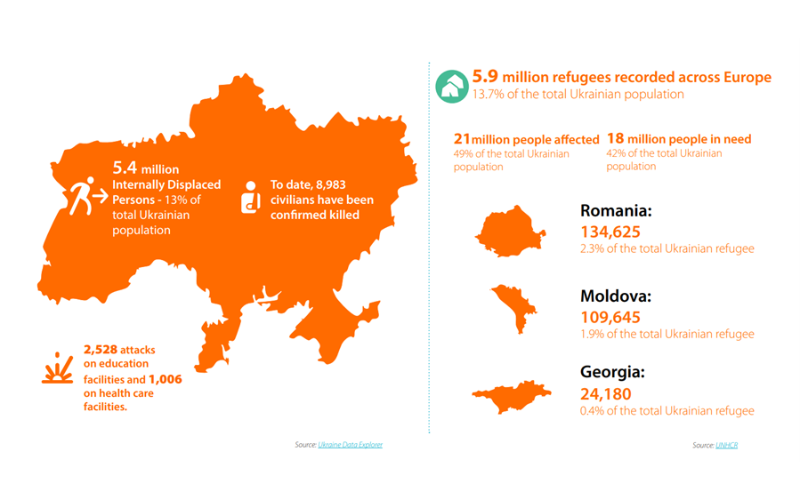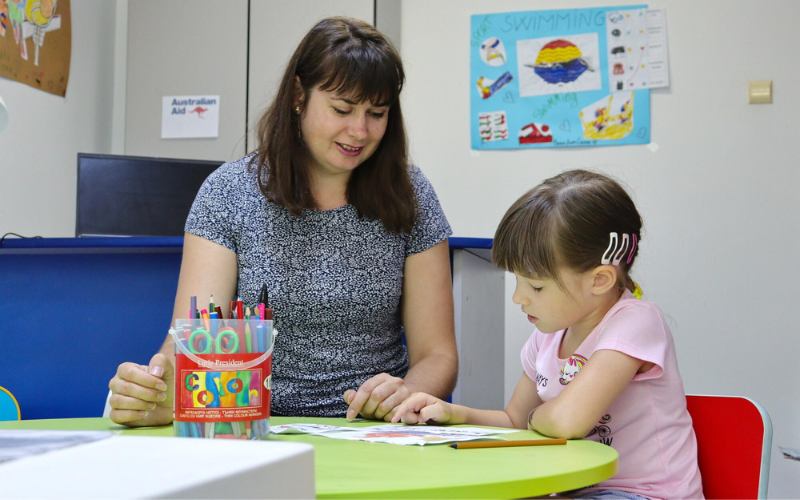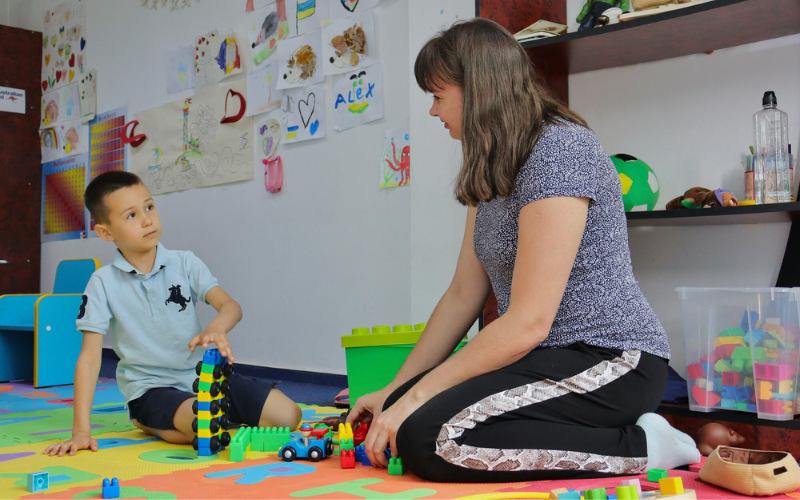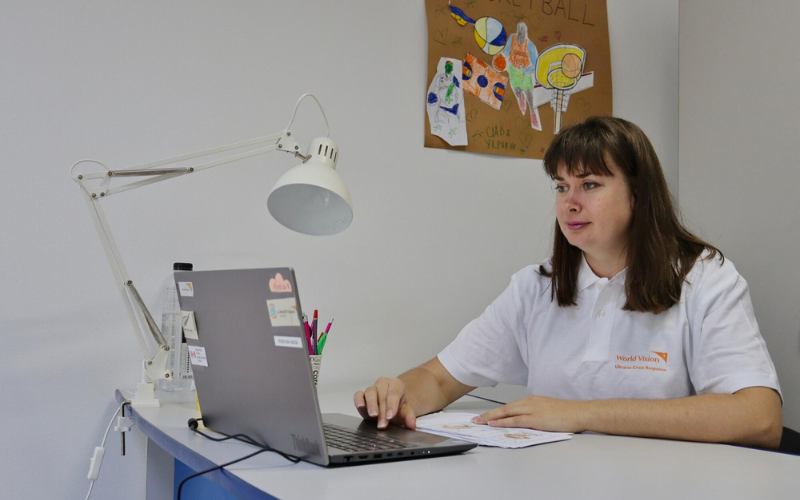Written by Laurentia Jora and Samson Okalow
The conflict in Ukraine is now well into its second year with little sign of ending. Nearly nine thousand civilians are confirmed dead. About 27 per cent of Ukraine’s population has been either internally displaced or are living as refugees in neighbouring countries. In total, 21 million people have been affected by the conflict.
On top of that a global hunger crisis was made worse in 2022 when over 13 million tons of grain destined for export became unavailable due to the conflict. A deal was brokered between Ukraine and Russia that eased the problem, but it collapsed in July 2023, reigniting the prospect of mass hunger and starvation.
 Infographic courtesy The Humanitarian Data Exchange and UNHCR.
Infographic courtesy The Humanitarian Data Exchange and UNHCR.
World Vision has been
active in the country and surrounding region since shortly after the crisis began on February 24, 2022. Our strategic goal continues to be to deliver inclusive, need-driven humanitarian assistance to refugees, Internally Displaced Persons and the most vulnerable children and their families in Ukraine, Romania, Moldova and Georgia.
How children are coping with the trauma of war
As with most conflicts, children bear the brunt of the suffering.
The Ukraine Humanitarian Needs Overview (HNO) estimates that 3.4 million children in Ukraine need immediate child protection services.
But amidst the turmoil, children are still finding recovery and hope. Seven-year-old Vika is among the over 100,000 refugees for whom Romania is now home. She’s found a place to play in a child-friendly space named Happy Bubble in the southeast Romanian city of Constanta. Happy Bubble is supported by World Vision and Global Affairs Canada.
 Nadiia Vesnina, World Vision's Mental Health and Psychosocial Support (MHPSS) Officer, guides seven-year-old Vika with her assignment at World Vision's Happy Bubble in Constanta. Photo: Laurentia Jora
Nadiia Vesnina, World Vision's Mental Health and Psychosocial Support (MHPSS) Officer, guides seven-year-old Vika with her assignment at World Vision's Happy Bubble in Constanta. Photo: Laurentia Jora
Vika sits intently at a small green wooden table, her tiny hands holding a pencil. Nadiia Vesnina, World Vision’s Mental Health, and Psychosocial Support Officer, guides her to finish her task.
“I don’t have anyone to play with at home. All my friends are in Ukraine or have fled to other countries,” says Vika, who came from Kherson, a city in southern Ukraine. “When I started coming to the Happy Bubble, I made so many new friends. I don’t feel alone anymore.”
At Happy Bubble, a variety of occupational therapy strategies are used to improve children’s emotional well-being.
“We conduct ‘Say and Play’ sessions where parents and their children express their feelings and experiences through games,” shares Nadiia Vesnina. She says the activities improve the bond between children and parents, non-verbal communication skills and emotional awareness.
In addition, Ukrainian toddlers and youngsters participate in “Social Skills” and “Creative Hands” classes. During the Social Skills activities, they learn how to cope with stressful situations and come up with solutions.
“The ‘Creative Hands’ sessions, namely handicraft activities, help children with brain development,” says Nadiia. “They master one skill at a time, including body awareness, direction, muscular endurance, agility, problem-solving, emotional resilience, and breathing.”
Early in the morning, Veronika and her seven-year-old son, Illia, make their way to Nadiia’s psychosocial class. A few months ago, their lives were upended when they fled their home in Kakhovka, a city recently devastated by severe flooding when a nearby dam was destroyed in the fighting.
“Even though we are physically here, our hearts are always in Ukraine. I don’t know what is left of my house,” says Veronika. “I bring Illia daily to the Happy Bubble because I see how much he has changed after attending the activities. He is more sociable, and open to life.”
 Nadiia (right) plays with Illia, 7, who is from Kakhovka, recently devastated by severe flooding caused the dam's destruction. (Photo: Laurentia Jora)
From becoming a refugee to serving Ukrainian children
Nadiia (right) plays with Illia, 7, who is from Kakhovka, recently devastated by severe flooding caused the dam's destruction. (Photo: Laurentia Jora)
From becoming a refugee to serving Ukrainian children
To date, World Vision Ukraine Crisis Response has reached more than 300,000 people in Romania, including Ukrainian refugees and hosting communities, through psychosocial support, basic needs, health, cash and vouchers, and educational programs.
“Even after a year, classes are still full, and parents bring their children to activities daily. It shows how significant our educational and mental health work,” Nadiia says of Happy Bubble.
“A year ago, I dealt with different children in terms of behavior and emotional intelligence. Their mental health has substantially improved,” she continues.
Before the war, Nadiia served as the Head of the Inclusive Center in the town of Pokrovske, Dnipropetrovsk Oblast, in east-central Ukraine.
With a psychology background, she worked with children with disabilities, behavioral disorders, and special needs.
She vividly remembers those frosty winter days. “There was no power. The roads were empty. We were constantly on high alert,” she recalls.
In March 2022, she became a refugee herself when she fled to a small village in neighbouring Bulgaria. Unable to secure a job in her field of expertise, she initially worked as a cleaner in a local hotel.
 Nadiia Vesnina, a World Vision Mental Health, and Psychosocial Support Officer, says there is deep meaning to everything she does for children. Photo: Laurentia Jora
Nadiia Vesnina, a World Vision Mental Health, and Psychosocial Support Officer, says there is deep meaning to everything she does for children. Photo: Laurentia Jora
Nadiia’s commitment and competence were finally recognized in February 2023 when she was hired as an MHPSS Officer by World Vision.
“When you are contributing to these children’s lives who witnessed bombings and violence, your life becomes so much more complex,” says Nadiia. “I have a deep meaning to everything I do. This makes all the difference in the world to my well-being as well.”